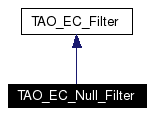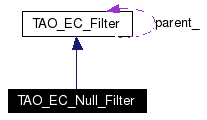
#include <EC_Filter.h>
Inheritance diagram for TAO_EC_Null_Filter:


Public Member Functions | |
| TAO_EC_Null_Filter (void) | |
| Constructor. | |
| virtual int | filter (const RtecEventComm::EventSet &event, TAO_EC_QOS_Info &qos_info) |
| virtual int | filter_nocopy (RtecEventComm::EventSet &event, TAO_EC_QOS_Info &qos_info) |
| virtual void | push (const RtecEventComm::EventSet &event, TAO_EC_QOS_Info &qos_info) |
| virtual void | push_nocopy (RtecEventComm::EventSet &event, TAO_EC_QOS_Info &qos_info) |
| virtual void | clear (void) |
| virtual CORBA::ULong | max_event_size (void) const |
| Returns the maximum size of the events pushed by this filter. | |
| virtual int | can_match (const RtecEventComm::EventHeader &header) const |
| virtual int | add_dependencies (const RtecEventComm::EventHeader &header, const TAO_EC_QOS_Info &qos_info) |
This filter accepts any kind of event, it is useful for the implementation: a) Consumers that accept all events b) Consumers that trust the filtering done at the Supplier layer. c) Event Channels that don't do filtering (such as CosEC backends)
Definition at line 172 of file EC_Filter.h.
|
|
Constructor.
Definition at line 39 of file EC_Filter.inl.
00040 {
00041 }
|
|
||||||||||||
|
This is used for computing the scheduling dependencies: Leaf filters check if the header could be matched, similar to the can_match() method; if it does they return 1, and 0 otherwise. Intermediate nodes always return 0. This is used to build precise dependencies between the suppliers and the leaf of the filters that accept that event. Notice that only the nodes doing scheduling recurse through the list, so in configurations that do no require scheduling the recursion stops fairly soon. Implements TAO_EC_Filter. Definition at line 113 of file EC_Filter.cpp.
00117 {
00118 return 0;
00119 }
|
|
|
Returns 0 if an event with that header could never be accepted. This can used by the suppliers to filter out consumers that couldn't possibly be interested in their events. The rt_info and Implements TAO_EC_Filter. Definition at line 105 of file EC_Filter.cpp.
00106 {
00107 // @@ This method should be correctly so we can implement null
00108 // filtering at the consumers but real filtering on the suppliers.
00109 return 1;
00110 }
|
|
|
Clear any saved state, must reset and assume no events have been received. Implements TAO_EC_Filter. Definition at line 92 of file EC_Filter.cpp.
00093 {
00094 // do nothing
00095 }
|
|
||||||||||||
|
Filter this event, returns 1 if the event is accepted, 0 otherwise. Notice that there are two versions of the method, if the event is not const then filter can take ownership of the event.
Implements TAO_EC_Filter. Definition at line 56 of file EC_Filter.cpp. References RtecEventComm::EventSet, and push().
00058 {
00059 // This is a leaf, no need to query any children, and we accept all
00060 // events, so push it.
00061 this->push (event, qos_info);
00062 return 1;
00063 }
|
|
||||||||||||
|
Implements TAO_EC_Filter. Definition at line 66 of file EC_Filter.cpp. References RtecEventComm::EventSet, and push_nocopy().
00068 {
00069 // This is a leaf, no need to query any children, and we accept all
00070 // events, so push it.
00071 this->push_nocopy (event, qos_info);
00072 return 1;
00073 }
|
|
|
Returns the maximum size of the events pushed by this filter.
Implements TAO_EC_Filter. Definition at line 98 of file EC_Filter.cpp.
00099 {
00100 // @@ Is there a better way to express this?
00101 return 0;
00102 }
|
|
||||||||||||
|
This is called by the children when they accept an event and which to pass it up. Notice that there are two versions of the method, if the event is not const then filter can take ownership of the event. Implements TAO_EC_Filter. Definition at line 76 of file EC_Filter.cpp. References RtecEventComm::EventSet, TAO_EC_Filter::parent(), and TAO_EC_Filter::push(). Referenced by filter().
|
|
||||||||||||
|
Implements TAO_EC_Filter. Definition at line 84 of file EC_Filter.cpp. References RtecEventComm::EventSet, TAO_EC_Filter::parent(), and TAO_EC_Filter::push_nocopy(). Referenced by filter_nocopy().
00086 {
00087 if (this->parent () != 0)
00088 this->parent ()->push_nocopy (event, qos_info);
00089 }
|
 1.3.6
1.3.6